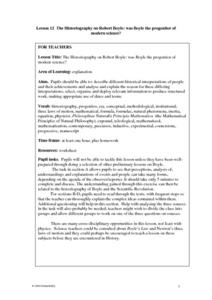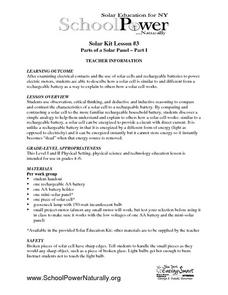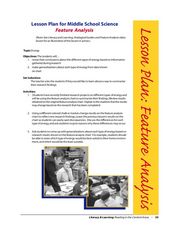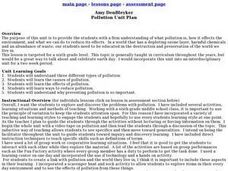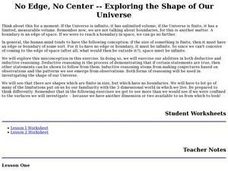Curated OER
Inductive Reasoning
In this science learning exercise, students read two example problems that include a problem, observation, and conclusion. Students also answer 2 questions using inductive reasoning.
Curated OER
Count on Me
Fourth graders use inductive reasoning to find algebraic patterns in geometric figures. They use technology (i.e., calculators, computers) and manipulatives to discover number patterns involving geometric concepts. They solve concrete...
Curated OER
The Right Stuff
Studentsare introduced to the Pythagorean Theorem by exploring right triangles and the squares built on each side. They apply the Pythagorean Theorem to real-world problems. Students u se informal and nonformal arguments of proof (i.e.,...
Curated OER
Problem-Solving Methods in Biology
In this problem-solving worksheet, students will read a biologist's observations about elephant communication. Students will write down what the biologist observed, what facts she knew about elephants, and her hypothesis. Students will...
Curated OER
"Croak" Science Mystery
Solve the mystery of a declining frog population! Lead your junior ecologists on an investigation that simulates actual events concerning pollution, predation, poaching, and more. Investigators read a story online, then analyze survey...
Curated OER
Solar Kit Lesson #3 Parts of a Solar Panel - Part I
A solar cell is similar to a rechargeable battery in many ways. Science lab groups connect each in a series circuit to run a mini motor and then compare and contrast them by answering questions and completing a Venn diagram. This is an...
Curated OER
Scientific Methods in Biology
In this scientific methods learning exercise, students will review the steps necessary in testing a hypothesis including the types of reasoning and variables involved. This learning exercise has 6 terms in a crossword puzzle and 4 fill...
Curated OER
What Is The Concept?
Students systemically determine the concept that the waste items placed in a "yes" category are biodegradable and those in the "no" category are not. This activity is a motivating way to introduce a unit on wastes by having students use...
Curated OER
Environmental Health Ethics
Students use inductive reasoning to study different scenarios related to environmental issues. They evaluate various scenarios to develop common definitions and key concepts in environmental health ethics.
Curated OER
The Historiography on Robert Boyle: Was Boyle the Progenitor of Modern Science?
Students participate in a warm-up activity by attending a football match writing an account of who won the game. They discuss how their account could differ from someone else's account of the game. They discuss how different people's...
Curated OER
Visible Pulse!
Young scholars demonstrate their understanding of Human Body Systems by showing connections between external and internal body structures and how they help humans survive. They use either deductive or inductive reasoning to explain...
California Education Partners
Science Fair Project
Plant the data firmly on the graph. Given information about the growth rate of plants, pupils determine the heights at specific times and graph the data. Using the information, scholars determine whether a statement is true and support...
Curated OER
What is the Concept?
Students systemically determine the concept that the waste items placed in a "yes" category are biodegradable and those in the "no" category are not. This activity is a motivating way to introduce a unit on wastes by having students use...
Curated OER
What was Newton's Idea of Science?
Students form logical foundations for analysis of observations. They improve analytic reading abilities through practice. Students investigate the foundations of scientific thought processes and how to apply them.
Curated OER
Four Color Map
Students explore geometry by completing a color puzzle. For this shape identification lesson, students utilize deductive reasoning to complete a Google SketchUp puzzle with trapezoid, triangles and rectangular shapes. Students...
California Department of Education
Possible Careers
Is a STEM career the right choice for me? Lesson four in a six-part career and college readiness series introduces seventh graders to the world of STEM occupations. Individuals use their Holland code results to select, research, and...
Curated OER
Is Global Warming Happening?
Students investigate the probability of global warming and the effects of global warming on the environment. They conduct Internet research and collect data, transfer the data onto an Excel spreadsheet, and create a presentation that...
Curated OER
Parts of a Solar Panel-Part I
Young scholars examine electrical contacts, solar cells, and rechargeable batteries and compare and contrast the characteristics of a solar cell to a rechargeable battery in a hands-on activity. Students complete a worksheet as they...
Curated OER
Physics Park
Young scholars research and design a playground for a park or school in their community. They explore the physics concepts that are present in the design and, if applicable promote their ideas to city or school officials.
Curated OER
Determine the molarity of an unknown HCl solution
Students complete a lab to help develop a comprehension of stiochiometry. They review equation writing, equation balancing, and stiochiometry. Studnets are given the following information: Sloppy students from the previous class have...
Curated OER
How the Environment Affects Our Health
Ninth graders explore how the environment affects health. In this infectious disease instructional activity, 9th graders investigate what environmental situations cause infections diseases. Students study the symptoms, treatments,...
Curated OER
Feature Analysis
Students research and analyze energy. In this energy lesson, students research types of energy and complete a feature analysis chart using chalk or markers. Students write generalizations about each type of energy based on their chart.
Curated OER
Pollution Unit Plan
Sixth graders examine what pollution is and the ways in which it effects the environment. They investigate ways to reduce it effects in this unit of lessons.
Curated OER
No Edge, No Center -- Exploring the Shape of Our Universe
Students examine various "spaces" (including ones that are one-dimensional, two-dimensional, and three-dimensional). For each space, they will examine what it means to have or not have an edge, or to be finite or infinite.











